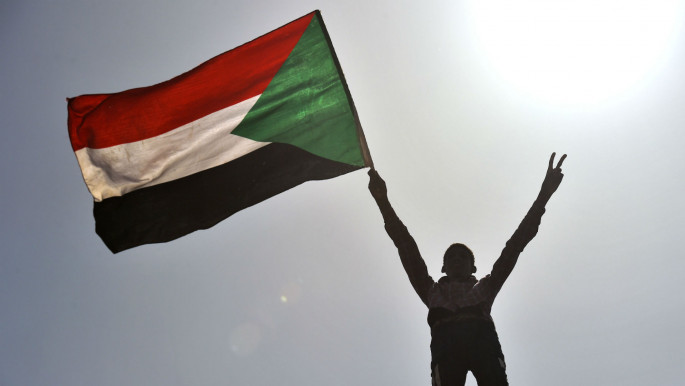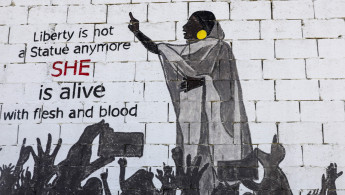For Sudan's women, the fight against FGM has only just begun
While an amendment to the country's criminal code was approved, it still needs to be passed by members of the sovereign council, which assumed power following the ouster of long-time dictator Omar al-Bashir last year. The Sudanese Ministry of Foreign Affairs called the move "an important positive development".
"A final law criminalising FGM is yet to be formally ratified, but it's an important step forward," said Giulia di Porcia e Brugnera, Programme Associate at the United Nations Population Fund (UNFPA) Sudan, describing it as a sign of the new government's commitment towards democracy and equality.
But she also cautioned against excessive optimism over the significance of the draft law, noting that previous attempts to ban the infamous practice nationally were unsuccessful under al-Bashir. The proposed law could also spark a backlash by Islamist groups that backed the former dictator and currently occupy positions of power.
"The cabinet wants to be seen in a good light, proving that it is resolved to tackle women's rights issues, which Sudan came under fire for during 30 years of oppression [under al-Bashir's regime]," noted Faiza Mohamed, Africa regional director for Equality Now, an NGO striving to protect and promote the rights of women and girls.
 |
The revolution isn't over for us. The way the transitional government is treating women is an extension of Bashir's regime |  |
Sudan is making efforts to implement the Universal Periodic Review (UPR) recommendations of the UN Human Rights Council (HRC), reaffirming its willingness to pass national legislation to prohibit FGM. The practice was made illegal in some Sudanese states a few years ago, but these bans were largely ignored.
FGM includes all procedures that involve the partial or complete removal of the female external genitalia for non-medical reasons. The practice can cause life-long health problems including painful sex, infertility, fatal childbirth complications, bleeding or repeated infections which may lead to death. Not only is it a serious human rights violation, it is a harmful practice.
Sudan is thought to have one of the highest rates of FGM in the world, with almost 87 percent of its female population between the ages of 15 and 49 reportedly affected by the procedure, according to UNICEF's Multiple Indicator Cluster Surveys (MICS) in 2014.
 |
|
| Read more: 'A portal into tomorrow's Sudan': Inside the sit-in that brought down Sudan's dictator Bashir |
In many cases, Sudanese women and girls are subjected to an extreme form known as infibulation, consisting of sewing up most of the vagina after the removal of the external genitals. Most of the procedures are carried out by nurses, midwives or other medical personnel.
It is a traditional belief of many Sudanese that the practice safeguards the family's honour and their daughters' marriage prospects, linking it with pre-marital virginity and marital fidelity. Consequently, there is much stigma against women who are not cut.
Although the government's decision to criminalise FGM was welcomed both inside and outside of the country, Sudanese feminists have warned that it cannot be considered a victory until all forms of discrimination and violence against women end. Despite women in Sudan facing threats of child marriage, domestic violence and rape, there are few policies in place to protect them.
"We as women of Sudan are not quite excited about this draft law. We are still living under extremely misogynistic legal laws," Hala Alkarib, regional director of the Strategic Initiative for Women in the Horn of Africa (SIHA), told The New Arab. "Nobody knows what's in the draft and what it actually entails".
"Sudan's legal framework is notoriously patriarchal and discriminatory against women. Without addressing the framework as a whole as well as the misogynistic beliefs and practices that maintain and reproduce it, it is unlikely that criminalisation of FGM alone will resolve the issues," SIHA's director said in a statement, questioning whether "the piecemeal legal reform" would succeed in bringing about an end to the practice.
 |
Sudan is thought to have one of the highest rates of FGM in the world, with almost 87 percent of its female population between the ages of 15 and 49 reportedly affected by the procedure |  |
While the outlawing of the horrific procedure is a positive move, more legal reforms are needed to tackle discriminatory gender attitudes, as Sudanese women continue to face other forms of violence at home and in their communities.
SIHA has indicated a number of necessary legal provisions including the introduction of legislation against domestic violence, the revocation of "morality" laws that police how women dress and act in public, and the reform of the Personal Status Law which "leads up to" forced marriage from the age of 10.
The regional women's rights group explained that forced marriage is enabled by the legal enshrinement of male guardianship. Furthermore, the criminal code "re-victimises" survivors of sexual violence through existing adultery laws that criminalise only women, as well as pregnancy outside of marriage.
 |
|
| Read more: 'Fighting for our stolen rights': Sudanese women call for social justice revolution |
"They [Sudan's authorities] cannot ban FGM while they are still repressing women," Alkarib argued, saying that the situation of Sudanese women has not changed despite them being the driving force of the revolution that brought down al-Bashir in April of 2019.
"The revolution isn't over for us," the Sudanese activist emphasised. "The way the transitional government is treating women is an extension of Bashir's regime".
In November, transitional authorities repealed the public order law restricting women's freedoms of dress, movement, association, study and work. But the articles governing women's dress code and behaviour in public spaces are still in the criminal law.
 |
With a high prevalence of FGM in the country, the Sudanese women's movement has been leading the fight to end the practice |  |
With a high prevalence of FGM in the country, the Sudanese women's movement has been leading the fight to end the practice. Rights groups warn that, because the practice is deeply rooted in Sudan's culture and society, it will take a long time to be eradicated entirely.
"Having a law against FGM is the first place that can bring change, acting as a deterrent," Equality Now's Africa director said. "The challenge will come in enforcing it since people have for years been kept hostage by patriarchal structures and misogynistic beliefs".
Women activists fear that merely criminalising the act of performing the procedure could cause more harm to the lives of Sudanese women.
"We are worried about what this draft could involve, whether it might end up endangering more lives and further penalising those midwives who choose to resort to conducting FGM secretly by traditional means," SIHA's director said, voicing a concern shared by women's rights groups.
 |
|
| Read more: The Sudan Uprising and the critical role of social media |
"Criminalisation could only push female circumcision underground without eradicating it," Sufian Abdul-Mouty from UNFPA Sudan Communication team said.
He emphasised that working at the community level is key to tackling the problem by increasing public understanding about the consequences of FGM.
"We have teams in the field working closely with tribal leaders while trying to reach all the communities, raising awareness, and supporting with reproductive health and gender-based violence services," Abdul-Mouty explained.
As part of its community outreach work in Sudan, UNFPA has organised community declarations, a very promising method that involves gathering key local figures like religious and community leaders to hold public ceremonies where a community commits to ending female circumcision. In 2019, UNFPA supported community declarations that reached more than 20,000 people. Six communities made public declarations to abandon FGM.
"What the community does has a lot more influence on the lives of women and girls than the legal system," di Porcia said. "By stating publicly that they commit to stop the practice, local leaders can make the whole community comply".
Anti-FGM activists have called for launching campaigns to raise public awareness in order to help avoid social resistance to the criminalisation of the procedure, including informing health service providers, fathers, mothers, and young people about the new legislation.
 |
While outlawing the horrific procedure is a positive move, more legal reforms are needed to tackle discriminatory gender attitudes |  |
Sudan's Foreign Ministry said that full enforcement of an anti-FGM law demands joint efforts and close coordination with all partners, particularly community groups and civil society organisations.
Ms Mohamed pointed to some factors that should accompany the law's implementation such as local monitoring and reporting, punitive measures, public education, funding of law enforcement agents, and counselling for female victims.
"If a community sees strong vigilance from the state in ensuring women and girls are protected from genital cutting, I'm sure people will go by the law," the Africa head for Equality Now said.
Sudan is one of only two African countries that is not a signatory to the International Convention on the Elimination of All Forms of Discrimination against Women (CEDAW). It is also one of nine African countries that have signed but not ratified the Protocol to the African Charter on Human and People's Rights on the Rights of Women in Africa
Alessandra Bajec is a freelance journalist currently based in Tunis.
Follow her on Twitter: @AlessandraBajec



